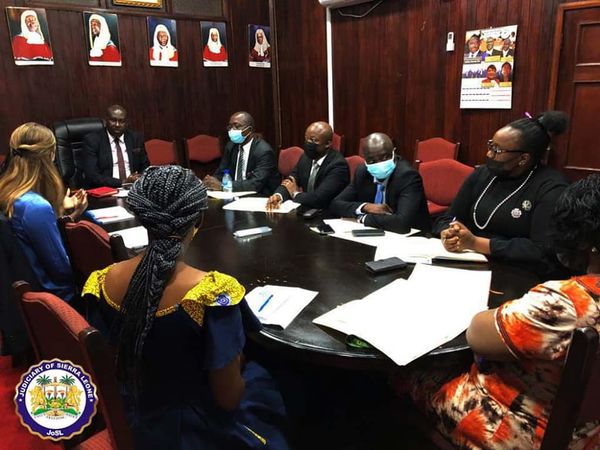By Elkass Sannoh
The United Nations Development Program (UNDP) Advisory Mission on Elections has been assured by the Chief Justice, His Lordship Justice Desmond Babatunde Edwards of the Judiciary’s readiness and firm commitment to promote electoral justice to ensure free, fair and credible elections across the country.
The Honourable Chief Justice said, “We in the Judiciary are ready to promote electoral justice as our function is to do justice. We’re here to ensure that we have credible, free and fair elections and we’re here to do that job, we’re not going to relent in doing that.”
Based on what he said, over the years, the Judiciary’s willingness to uphold electoral justice has come with added responsibility which requires the support from all key players in ensuring that electoral justice is achieved.
He said when he took up office in 2018, the country’s entire population against the total number of Judges and Magistrates (Judicial officers) indicated that a judicial officer had 143,000 people assigned to him, which in itself was a serious burden on the limited number of judges in the discharge of their duties.
He continued that under his leadership, premium has been placed on increased access to justice with the appointment of more judges and judicial staff in various parts of the country. This move, he said, has reduced the number to 98,000 citizens to a judicial officer, stressing that the number is still below the African average of one judicial officer to 33,000 persons. Worldwide, he said, the average is one judicial officer to 5,650 persons.
Notwithstanding the small number of Judges, the Hon. Chief Justice assured that with elections around the corner, his administration is ready and willing to deploy not less than 15 Judges to handle electoral matters across the country.
For the handling of Electoral offences, petitions among others, he used the occasion to call for support to the Judiciary with the setting up of an Independent Electoral Court and Registry at the former ‘dilapidated Special Court building’ in Freetown. He also proposed for Independent Electoral Court Registries in each of the Provincial headquarter towns in the Provinces.
The above-mentioned deployments would require logistics, the Chief Justice continued, to go with same and it was up to UNDP and its partners to see to the provision of such logistics including vehicles for judges, computers, accessories, internet connectivity, motorbikes for bailiffs and other available support for support staff.
He reiterated the need for refresher’s training and capacity building for Judges, as part of what would assist Judges to expeditiously handle election matters.
“The Judicial and Legal Training Institute (JLTI) of the Sierra Leone Judiciary has had an impressive history of multiple effective training of Judges, Administrative staff and paralegals which include; Sexual Offences Model Court, Refresher’s training, Industrial training and a host of others and with its well-endowed faculty members and tutors was ready to handle such training with support from UNDP,” the Chief Justice said.
While noting that the Election Petition Rules 2007 do not serve the purpose for expeditions trials of electoral cases in the country, the Hon. Chief Justice said there was need to revisit the Elections Petition Rules of 2007 for amendment.
“The Elections Petition Rules of 2007 which are the rules by which you bring Parliamentary petitions to the court need amendment, and the Rules of Court Committee is prepared do same with support from UNDP and its partners,” he disclosed.
The Chief Justice requested more copies of the Compendium on Electoral Laws and said that current amendments should be incorporated immediately within the newly printed Compendium.
Having stated the purpose of the meeting which looked at existing structures to ensure electoral justice were well in place and in preparedness for electoral cycle, 2020-2024, the Governance and Peace building Coordinator for UNDP in Africa, Dr. Roselyn Akombe, said she was impressed with the level of readiness shown by the Judiciary, it being one of the key players in upholding democratic governance.
She assured the Chief Justice of UNDP’s continued support to the Judiciary and further commended the current administration on their firm commitment and readiness to put the necessary structures in place geared towards ensuring expeditious trials of electoral cases.
On his part, Court of Appeal Judge, Hon. Justice Monfred Sesay JA, re-emphasized the need for support to the Judiciary especially with vehicles for Judges.
He described those needs as ‘necessities in fostering effective service delivery’ on their part.
He added that it is not only risky but very dangerous for Judges to be without a vehicle which will always put their lives on the line after delivering a Judgment or to slam an Injunction that is not favorable to the other party.
Also present at the meeting were the UNDP’s Sierra Leone Governance Specialist, Josephine Scott-Manga; UNDP Electoral Systems Support Brussels, Sare Knoope, Court of Appeal Judges; Justices Komba Kamanda and Alhaji Momoh-Jah Stevens, Master and Registrar, the Deputy Master, Court Operations Manager, Principal Accountant and the Confidential Secretary to the Chief Justice.




